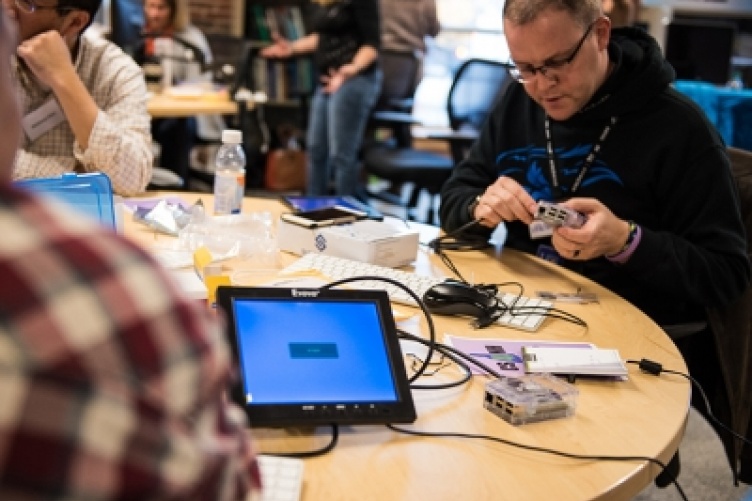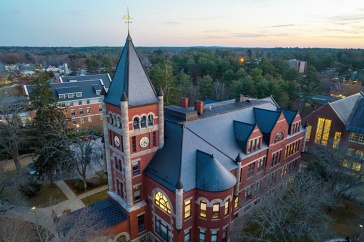
Educators explore computer science activities to bring back to their classrooms at CS4NH Launch Day.
When today’s elementary school students become adults, they will live in a world run on computers. Computer science is one of the fastest growing job sectors in the country, but the number of students graduating with a computer science degree is far below what the job market today demands.
Better preparing students for careers in computing is a challenge that’s been identified here in New Hampshire, as well as across the country, and something the New Hampshire Department of Education, the UNH STEM Discovery Lab and the STEM Teachers Collaborative at the UNH Leitzel Center are working to address with the launch of CS4NH. This new initiative is aimed at providing every student in the state a chance to learn about computer science in grades K-12 to prepare them for the emerging demands of the 21st century.
Roughly 120 teachers and administrators gathered at the University of New Hampshire at Manchester on Saturday for CS4NH Launch Day to mark the official start of the initiative in the state. It is part of the national CS for All initiative unveiled by the White House earlier this year with the goal of providing students the skills needed to participate as creators and innovators in the tech economy, not just consumers.
Mike Decelle, dean of UNH Manchester, welcomed the educators and emphasized the importance of preparing more students for careers in computer science. UNH Manchester last year placed 91 percent of its seniors into full-time employment or a graduate program within four months of graduation, said Decelle.
“Employers are desperate for more graduates,” he said. “The vitality and health of the state of the economy depends on it.”
The Commissioner of the New Hampshire Department of Education, Dr. Virginia Barry, said she regularly hears from employers about enhancing the state’s computer science curriculum, something she has also heard from parents around the state.
“Parents know their child need to be prepared for future,” Barry said. “The enthusiasm and support to make sure our public school system is best in nation is really amazing.”
New Hampshire parents are not alone in their desire to see computer science better integrated into the schools. Keynote speaker Pat Yongpradit, chief academic officer for Code.org, an organization aimed at providing tools that expand computer science learning opportunities in schools, said 93 percent of parents in the U.S. want their children to study computer science in school, but only 40 percent of K-12 schools offer computer programming classes.
While job training is a primary goal in bringing computer science into the classroom, it shouldn’t be seen simply as something reserved for older students. Part of the challenge of adopting a computer science curriculum is fighting the stereotypes that can dissuade some girls, minority students and other underrepresented groups in computing from becoming fully engaged.
“My belief is it should be taught in K through 12 and begin from a young age to dispel the stereotypes at an early age,” Yongpradit said. “We should also be showing all kids this is a foundational thing, not just an elective you learn in high school.”
Federal education guidelines acknowledge that computer science is part of a well-rounded education, and the educators who attended CS4NH Launch Day had the opportunity to learn new ways to bring that curriculum to their classrooms. Workshops discussed how to integrate virtual reality technology and the “internet of things” in schools, as well as coding workshops, math in computing and a presentation on engaging girls in tech. Educators were introduced to programs and teaching tools that can help them better integrate computer science and computational thinking practices into the classroom at all levels.
Funding for new programs and curriculum can often be a barrier, an issue that did not go unaddressed. The CS in Elementary workshop highlighted free online tools districts can use to introduce computer science and coding fundamentals to elementary students. Companies like Tynker and Code.org turn coding into a game, asking students to input commands to make space men jump through an obstacle course or direct Angry Birds through a maze. There are video tutorials on computing basics that feature sports stars and celebrities. Teachers were encouraged to prompt children to work collaboratively and at their own pace, helping sharpen their problem solving skills.
In the afternoon, a group of experts each had 5 minutes to present their area of expertise. Nick Soggu, president and CEO of SilverTech, spoke about internship opportunities for local high school students; UNH Associate Professor of Computer Science Mihaela Sabin spoke about the need for workers with computing skills in the Manchester area; and Mark Guzdial, professor of Computer Science at Georgia Institute of Technology, and Massachusetts Department of Education CS and STEM Coordinator Anne DeMallie both discussed ways other states have integrated a computer science curriculum. Following the presentation, the attendees broke out into smaller groups to further discuss topics of interest and finished with a networking session.
In the coming years, organizers plan to host an annual CS4NH Summit where educators can learn and collaborate on computer science curriculum. The initiative, headed by N.H. Department of Education STEM Director David Benedetto, will also continue to be a resource for schools and districts looking to expand their computer science programs.
-
Written By:
Beth LaMontagne Hall | Freelancer
















































